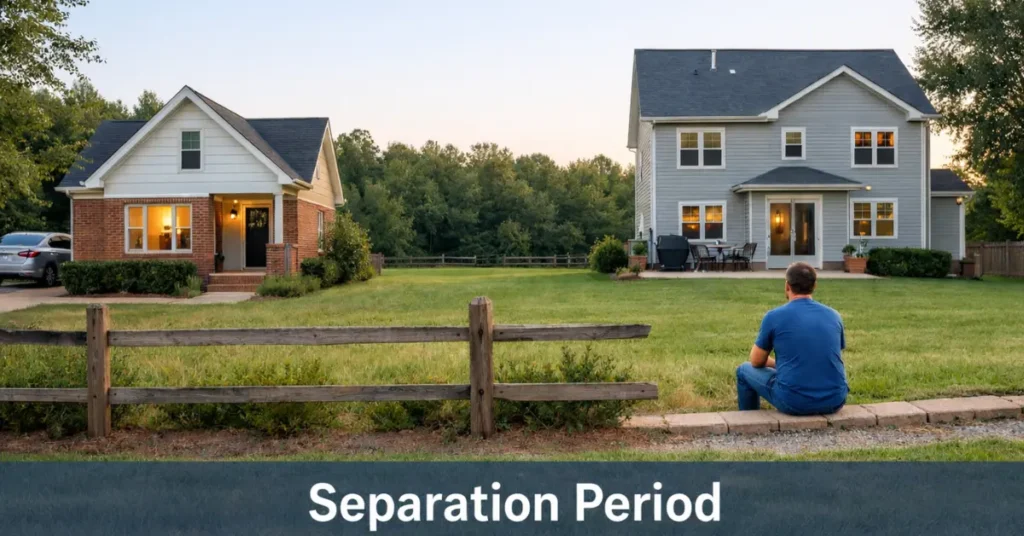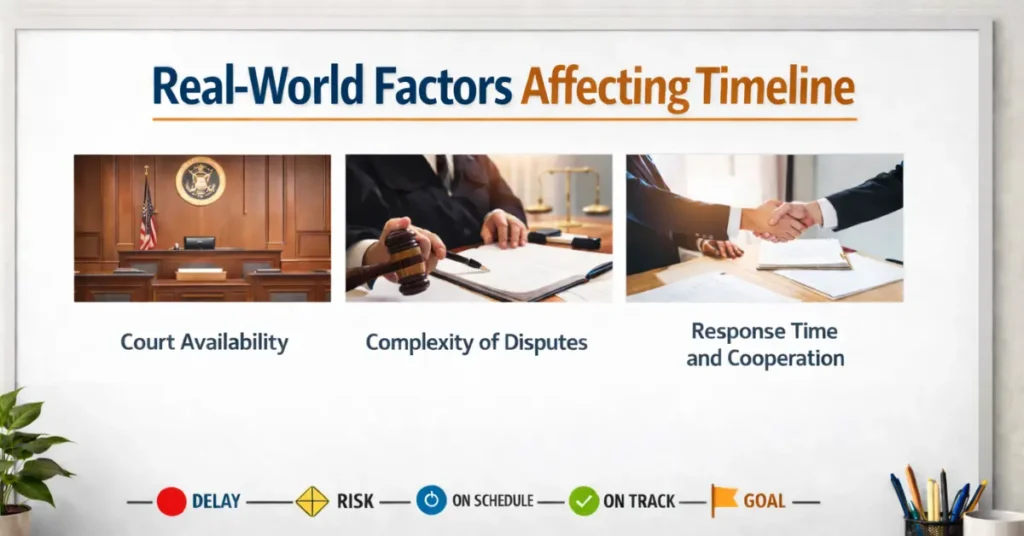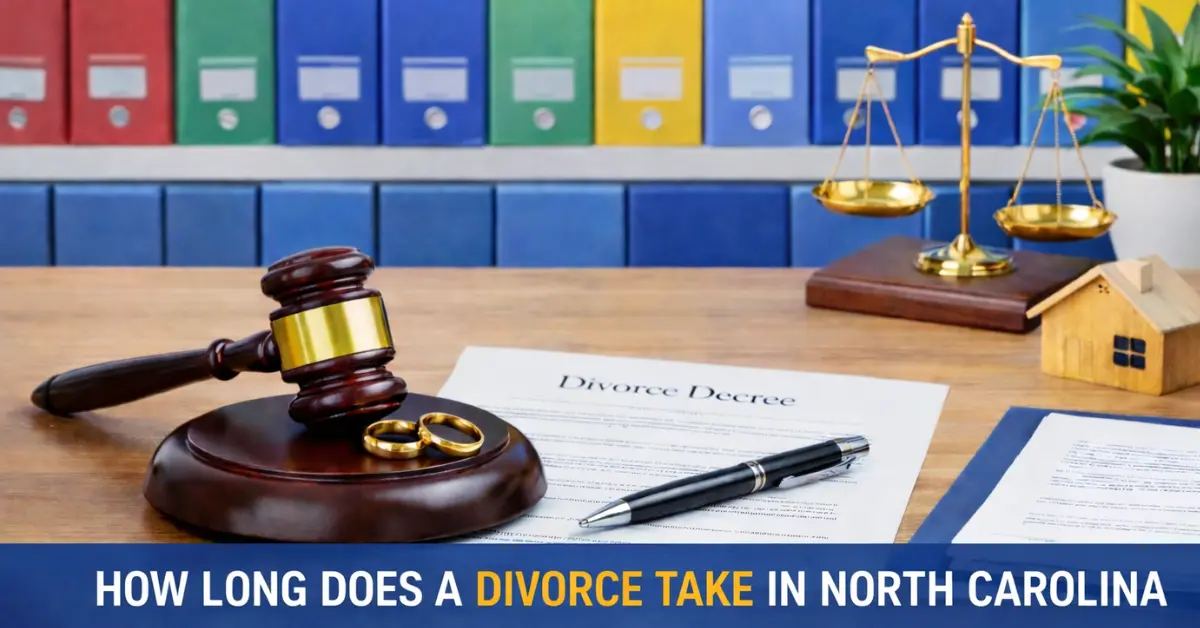Navigating a divorce can be a challenging and emotionally draining experience. For those going through or considering divorce in North Carolina, understanding the timeline is crucial. Knowing what to expect can help ease some of the uncertainty surrounding the process.
In North Carolina, the path to divorce includes clear legal requirements – most notably a mandatory separation period of at least one year before filing an absolute divorce. Various factors like filing procedures, court schedules, and whether the divorce is contested or uncontested also play essential roles in how long the process will ultimately take.
To provide a comprehensive look at North Carolina’s divorce process, this guide focuses on typical timelines, the impact of uncontested versus contested divorces, and the importance of meeting residency and separation requirements.
By understanding these elements, couples can better anticipate what lies ahead and work toward a smoother, more efficient resolution.
For instance, board-certified family law specialist Matt Arnold notes that North Carolina’s mandatory one-year separation period can actually serve as a valuable time for couples to resolve key issues, paving the way for a smoother divorce once that requirement is met.
This kind of expert insight underlines why knowing the timeline and legal steps in advance is so important.
Types of Divorce in North Carolina
Absolute Divorce (No-Fault Divorce)
Known commonly as a ‘no-fault’ or uncontested divorce, an absolute divorce is the standard form of divorce in North Carolina when the marriage is dissolved without assigning fault to either party, a distinction that often arises in discussions around Domestic partnerships vs marriage NC.
Both spouses agree to separate permanently, and after fulfilling the one-year separation requirement, either can file for divorce. This process is intended to be straightforward, especially if issues like alimony, child custody, or property division are already resolved by agreement.
In practice, an uncontested absolute divorce involves minimal court intervention – the judge’s role is mainly to verify that legal requirements are met and then enter the divorce decree. Because both parties are in agreement, there are typically fewer disputes to slow things down, making this the fastest and simplest route for ending a marriage.
Divorce from Bed and Board
Despite its confusing name, a Divorce from Bed and Board (DBB) is not a full dissolution of the marriage. Instead, it’s a form of court-ordered legal separation. This action, unique to a few states like North Carolina, is usually fault-based – one spouse must prove specific wrongdoing by the other (such as abandonment, cruel treatment, adultery, or substance abuse).
A DBB essentially forces a physical separation of the spouses and can address issues like who stays in the marital home, temporary support, and custody arrangements, but it does not officially end the marriage.
Often, a Divorce from Bed and Board precedes an absolute divorce. For example, a spouse might seek a DBB for immediate relief (especially in cases of misconduct or domestic abuse) and then, after the required one-year period, proceed with an absolute divorce.
This two-step process can make the overall timeline longer – the DBB itself involves court proceedings and, if granted, you still must wait out the separation period before obtaining the final divorce.
In short, while a DBB can provide crucial interim remedies (like exclusive possession of the home or temporary support), it adds complexity to the timeline since the actual divorce (absolute divorce) can only occur after the statutory waiting period.
Factors Influencing the Divorce Timeline
Several factors play a role in the time it takes to complete a divorce in North Carolina. Understanding these influences can help manage expectations, including practical considerations such as the Family Lawyer cost in NC:
Residency Requirements
North Carolina law mandates that at least one spouse must have lived in the state for a minimum of six months before filing for divorce. This residency requirement ensures the state’s courts have jurisdiction over the case.
If a couple recently moved to North Carolina, they will have to wait until this six-month residency threshold is met. For example, if a couple separates immediately after moving to the state, the earliest they could file for divorce would be six months later (and only if they have also satisfied the one-year separation rule).
In most cases, only one spouse needs to meet this requirement, and it’s typically the spouse who files the divorce complaint. Failing to meet residency prerequisites is a procedural roadblock – filing too early could result in a dismissal of the divorce petition and further delay the process.

Separation Period
In addition to residency, North Carolina imposes a mandatory separation period of at least one year and one day before an absolute divorce can be granted. Spouses must live “separate and apart” (in different residences, with the intent for the separation to be permanent) for this entire period.
This no-fault waiting period is unavoidable – even if both parties are in complete agreement about divorcing, the court cannot finalize an absolute divorce until the year has passed. The intent behind this law, originally established in 1931, is to give couples a cooling-off period to potentially reconcile.
In modern practice, some couples find the one-year wait frustrating, especially if the marriage is clearly over. During this time, they often negotiate and settle key issues (property division, custody, etc.) so that once the year is up, they can proceed quickly.
It’s important to note that any instances of resuming marital relations (for example, moving back in together or even occasional cohabitation) can reset the clock on this one-year separation. Thus, couples should be careful to maintain separate households continuously for at least 12 months plus one day before filing.
North Carolina is one of only two states with such a long no-fault separation requirement (only South Carolina has a similarly lengthy wait), so this factor makes divorces here inherently longer than in many other states.
Filing and Court Processing Times
Once the separation period ends and the complaint is filed, the timeline can vary widely due to court schedules and administrative processing. After filing the divorce petition, North Carolina requires a 30-day waiting period for the defendant (the other spouse) to be served and respond.
This functions as a post-filing cooling-off period or simply the standard response time in civil procedure. If the other spouse does not contest or fails to respond in those 30 days, the case can be set for an uncontested hearing relatively quickly.
In uncontested matters, a court hearing might be scheduled as soon as the docket allows – often a few weeks after the 30-day answer period has expired. However, the availability of court dates and local backlog can introduce delays.
North Carolina sees roughly 30,000+ divorces filed each year, so courts in busy counties (like Wake, Mecklenburg, or Guilford) may have crowded calendars. For instance, if there’s a backlog in civil court, even a simple uncontested divorce that’s otherwise ready to go might wait extra weeks for a hearing slot.
Filing fees must be paid and all paperwork correctly submitted; any errors (missing forms, incorrect information) can result in processing delays or the court clerk rejecting the filing, which adds time as parties correct and refile documents.
In short, after the one-year separation is over, the speed of the remaining process will depend on how quickly you file, how promptly the other spouse is served, and how soon the court can schedule and process the final hearing.
Other factors can also influence the timeline, such as the complexity of the case and whether issues are disputed. We’ll explore those in context below.
Steps in the Divorce Process and Typical Timelines
Understanding each step in the North Carolina divorce process can illuminate where potential delays might occur, especially for those exploring options like a quick divorce in USA. Below is a step-by-step look at the process with typical timelines:
Filing the Complaint
A divorce officially begins when one spouse files a Complaint for Absolute Divorce with the appropriate county court. Preparing this paperwork can range from a few days to a few weeks, depending on individual circumstances.
If you’ve already gathered the necessary information (marriage date, separation date, residency proof, etc.), the complaint and accompanying documents (summons, civil cover sheet, Servicemembers Civil Relief Act affidavit, etc.) can be completed relatively quickly.
Many people choose to have an attorney draft these to ensure accuracy, but North Carolina also offers resources (like a Guide & File online tool) to help self-represented individuals prepare divorce filings. Once the paperwork is ready, it is filed with the Clerk of Court in the county where either spouse resides, along with the required filing fee.
Timeline: The act of filing is quick, but getting to the point of filing depends on readiness – it could be done within a day or two if all information is at hand, or several weeks if there are complications in preparing the documents. After filing, a case number is assigned, and the clock starts running on the next step (service of process).
Serving the Spouse
After filing, the divorce papers must be formally served on the other spouse (the defendant). In North Carolina, service can be accomplished by the sheriff’s department, by certified mail (with return receipt), or by authorized delivery services (or, if those fail and the person cannot be located, by publication with court approval).
Once served, the spouse has 30 days to respond to the Complaint (they may also request a one-time 30-day extension, which is often granted, making it potentially 60 days total). This response period is mandated by law and essentially creates a minimum waiting time after service.
If the spouse fails to respond within the allotted time (and no extension is active), the case can proceed as an uncontested divorce by default. If they do respond and agree with everything (no contest), the case is still uncontested and can move forward to scheduling a hearing.
If they file an answer contesting any aspect (for example, disputing the separation date or raising issues about property, even though absolute divorce itself in NC doesn’t require fault grounds), then the matter becomes contested and will take longer.
Timeline: Serving the spouse can be as fast as a few days (if using sheriff or immediate mail and the spouse accepts service promptly) or a couple of weeks on average. The spouse’s response period of 30 days is usually waited out fully in most cases, meaning about a month of essentially built-in time after they’ve been served.
In an ideal uncontested scenario, you might file and serve the defendant quickly, the 30 days pass with no issues, and then you’re ready to request a hearing.

Court Processing and Hearing
Once the waiting period after service has elapsed, the next step is to schedule the divorce hearing (for an uncontested absolute divorce) or further proceedings if contested.
In a simple uncontested divorce – where all requirements (one-year separation, residency, proper filing, service, and no response issues) are met – a hearing can often be scheduled soon after the 30-day response window closes.
Some North Carolina counties allow the filing party to submit a request for a hearing date or even proceed by calendar request to have the divorce heard by a judge without both parties needing to appear, as long as all paperwork (including an affidavit of military status and proof of service) is in order.
Typically, an uncontested divorce hearing might be set within a few weeks to two months after the waiting period, depending on the court’s calendar. At the hearing itself, only brief testimony is required: one usually testifies to the date of marriage, date of separation (confirming it’s been over a year), residency, and that efforts at reconciliation have failed.
In a routine case, the judge may sign the divorce judgment on the spot. In fact, simple divorce hearings are usually very quick – often just a few minutes – and you may leave the courtroom with a copy of your divorce decree in hand that day.
This means that for uncontested cases, once you get to the hearing stage, the end is in sight within a matter of minutes or days (depending on how quickly the clerk processes the signed judgment).
For contested cases, the “court processing and hearing” phase is much more involved. After the initial filing and serving, if the spouse contests, the case may require temporary hearings, discovery, mediation, and ultimately a trial.
Temporary hearings (for interim child custody, support, etc.) might be held a month or two into the case. The discovery phase can last several months as both sides exchange financial documents, take depositions, etc.
North Carolina courts often mandate mediation for custody disputes and encourage it for property division and alimony disputes, which could occur a few months in. If mediation fails to resolve all issues, a trial date will be set – this could be many months to a year after filing, depending on how congested the court’s schedule is and how ready the parties are.
The trial itself might last a day or several days, and if the issues are particularly complex (e.g., a business valuation, custody evaluations), the trial could even be split over multiple days or weeks. After the trial, the judge may take additional time to issue a written ruling.
All these steps mean a contested divorce’s court phase is much longer and less predictable than an uncontested hearing. There may also be multiple court hearings (status conferences, pre-trial motions, etc.) along the way that add to the timeline.
In summary, for uncontested divorces, once the separation period is over, the steps move quickly: file, serve, wait 30 days, brief hearing, and finalize – often within 60 days or so after filing. For contested divorces, the process after filing can stretch from many months into multiple years, as discussed next.
Uncontested vs. Contested Divorce and Their Timelines
A key distinction in divorce duration is whether the case is uncontested or contested, a comparison often discussed alongside topics like no fault divorce in Virginia. The timeline difference between these two paths in North Carolina is dramatic:
Uncontested Divorce
An uncontested divorce is generally the fastest option. This means both parties agree on all terms (or the defendant doesn’t respond at all, effectively not contesting the divorce).
North Carolina is a no-fault divorce state, so the primary issues to agree upon typically revolve around ancillary matters like property division, custody, and support (though those can actually be handled separately from the absolute divorce).
If a couple has resolved everything in advance – often through a separation agreement during the one-year separation – the absolute divorce itself becomes a simple procedural step. After the 1-year separation and meeting the 6-month residency requirement, the divorce complaint is filed.
From that point, most uncontested cases in North Carolina take roughly 45 to 60 days to finalize in court. This timeframe accounts for the 30-day response period and scheduling a brief hearing soon thereafter.
In some instances, attorneys can file a motion for summary judgment or arrange for the divorce to be granted without a formal hearing if the defendant signs a waiver, but typically, a short court appearance is still needed.
The simplified nature of an uncontested divorce – no disputes for the judge to decide – results in fewer delays. It’s not unheard of for an uncontested absolute divorce to be completed in as little as approximately 45 days after filing, meaning about 13-14 months from the date of separation in total.
However, any mistakes in paperwork or hiccups in scheduling can push that a bit later, which is why a common estimate is 60–90 days post-filing to wrap up. The bottom line is that uncontested divorces proceed at the speed of procedure: you’re essentially waiting on the administrative timeline (service period, court date) rather than fighting over issues.
This assumes, of course, that all issues like child custody or marital asset division have been settled outside of court; if not, those issues might need separate processes (which could delay final resolution of those matters, though the divorce itself could be granted).
Uncontested divorce offers a straightforward path: meet the separation requirement, file correctly, avoid any need for litigation, and your divorce could be finalized a little over a year from when you separated.
Contested Divorce
A contested divorce, on the other hand, is when the spouses cannot agree on one or more key issues, necessitating further legal proceedings to resolve disputes. By its nature, this process is longer and more complex.
North Carolina contested divorces often involve disagreements on matters such as child custody, child support, alimony (spousal support), or the equitable distribution of marital property.
Any one of these disputes can significantly extend the timeline. For example, a fight over custody might require evaluations or a guardian ad litem for the child; a fight over property could require appraisals of assets and extensive discovery.
As a result, contested divorces commonly require mediation (North Carolina actually requires mediation in custody/visitation cases, and many districts require or strongly encourage mediated settlement conferences for equitable distribution as well).
If mediation and negotiation fail, the case proceeds to trial, where a judge (or sometimes a jury, in limited issues like some property questions) will decide the outcomes. All these steps add months or even years.
It is not unusual for a truly contested divorce in North Carolina to take 1 to 2 years (or more) from the date of filing to reach a conclusion. Notably, this 1-2 year estimate is in addition to the initial one-year separation period.
In practical terms, if a couple separates and then has a contested divorce, they might be looking at two to three years total before everything is finalized.
For instance, consider a scenario where significant assets are at stake and the parties litigate every issue: the case could involve a year of separation, plus a year and a half of litigation, meaning roughly 2.5 years from separation to divorce decree.
The more complex and contentious the issues, the longer it takes to reach a resolution. Contested cases also tend to have more court back-and-forth (motions, hearings, and possibly appeals) which can cause further delays.
As a cautionary example, if a spouse contests the date of separation itself (arguing the one-year requirement hasn’t been met), that issue might need to be litigated and proven in court, potentially delaying the divorce from even being granted.
Another example: if one spouse is uncooperative or uses delay tactics (like seeking extensions, changing attorneys, or not complying with discovery), the process can drag on. Because of all these variables, contested divorces have a wide range of timelines, but it’s safe to say they will be significantly longer than uncontested ones.
Many contested divorces in NC are resolved somewhere around the 18-month to 2-year mark after filing, but some high-conflict cases can extend well beyond that – occasionally taking several years if appeals are involved.
In summary, if speed and efficiency are priorities, an uncontested divorce is the way to go. Contested divorces should be approached with the understanding that patience will be required, and experienced legal guidance is crucial to navigate the extended process.

Legal Requirements and Potential Delays
Even with the best planning, certain legal requirements and common issues can introduce delays in the divorce timeline, including situations where parties attempt to prove adultery in divorce.
Waiting Periods
North Carolina’s waiting periods are built into the process by law and cannot be bypassed (except through very limited circumstances like annulment or a divorce from bed and board, which are different remedies).
The primary waiting period is the one-year separation discussed earlier – the divorce clock officially starts when spouses begin living apart with the intent for it to be permanent. That one year (actually one year and a day) is mandatory for an absolute divorce.
There is no shortcut around it for no-fault divorce; even evidence of fault (like adultery or abandonment) will not enable a divorce to be granted faster in North Carolina. The only narrow exception is an “incurable insanity” ground for divorce, which requires a three-year separation under very specific conditions – a rarely used provision.
Aside from the separation period, the 30-day post-filing waiting period after service of the complaint can be viewed as a second, shorter waiting period. This essentially functions as a cooling-off period or simply time for the defendant to respond.
During this time, nothing can be finalized; the court generally will not schedule a divorce hearing until at least 30 days have passed from service (and if the defendant asks for an extension to answer, that extends to 60 days).
This requirement is why even the simplest uncontested divorce cannot be done instantly after the year – you must add this roughly one-month window. Together, these waiting periods mean even under ideal circumstances, a divorce will take a bit over a year.
At a minimum, as one North Carolina family law attorney puts it, an absolute divorce can be finalized “in a minimum of a year and thirty days” from the start of separation. Understanding that these waits are by design helps manage expectations – they are not delays per se, but legal timing mechanisms.
Potential Delays
Beyond the mandatory waits, several common issues can delay the process further:
Court Backlogs
As mentioned, if the court’s docket is crowded, simply getting a hearing scheduled can take longer. For example, in some urban counties, an uncontested divorce hearing might not be available for several weeks after you become eligible. And for contested cases, securing trial dates can be challenging – you might get a trial date many months out due to other cases in line.
Disputes Over Key Issues
When spouses clash over property division, child custody, or alimony, it introduces steps like discovery and mediation that prolong the timeline. Negotiating settlements can take time, and if negotiations stall, waiting for a court date for the judge to decide will add more time.
A dispute over the valuation of assets or a heated custody battle could each add months of preparation and court hearings. Each contested issue is a potential source of delay, especially if expert witnesses (like child psychologists or financial appraisers) become involved.
Procedural Mistakes
If paperwork isn’t filed correctly or deadlines are missed, delays ensue. For instance, if a complaint is filed before the full one-year separation is met (even by accident, say you miscalculate and file one week early), the case will be dismissed – forcing you to refile after the date is reached.
Likewise, not serving the defendant properly will stall the case until proper service is completed, and any required filings (like the affidavit of military service), if overlooked, can cause the judge to refuse to hear the case until that’s fixed. Working with an experienced attorney is recommended to manage these procedural hurdles and avoid unnecessary delays.
Extensions and Continuances: North Carolina law allows the defendant to request an extension of time to respond to the divorce complaint (a common 30-day extension is often routine).
Additionally, either party might request continuances (postponements) of hearings or deadlines due to various reasons (needing more time to prepare, attorney scheduling conflicts, etc.). Courts may grant these for good cause, which can add weeks or months.
Additional Claims Tied to Divorce
If one spouse files claims for equitable distribution (property division), alimony, or other issues within the divorce action, those claims can extend how long the case remains open.
Notably, an absolute divorce can be granted before those other claims are resolved (they would then continue as separate proceedings), but many times attorneys will try to coordinate everything.
If everything is kept in one case, the divorce might not be finalized until all issues are heard together, which drags it out.
On the other hand, if you bifurcate and get the divorce decree entered while reserving other issues, you still may be in court over those issues afterward.
Either way, more claims = more complexity.
Overall, while an uncontested divorce might face only minor procedural delays, a contested divorce is prone to significant setbacks. It is not uncommon for contested cases to experience stop-and-go progress – periods of waiting punctuated by bursts of activity (mediation, hearings).
Being prepared and having good legal counsel can mitigate some delays but not all. Patience and a proactive approach (responding timely, providing documents when asked, etc.) can help keep things moving.
Average Timeline for Divorce in North Carolina
It’s often helpful to look at the average expected timelines for divorces in North Carolina, keeping in mind the uncontested vs. contested distinction. Remember that every case is unique, but averages provide a general guideline:
Uncontested Divorce (Average Timing)
In North Carolina, once the fundamental requirements are met (at least 1 year of separation and 6 months of residency), an uncontested absolute divorce can be relatively quick. Most uncontested cases are finalized roughly 60 to 90 days after filing the divorce complaint, on average.
This accounts for the 30-day response waiting period and some buffer for scheduling. If everything is in order, some cases indeed wrap up closer to the 60-day mark. To illustrate, imagine a couple that separated on January 1 of last year.
They become eligible to file after January 1 of this year. Say they file on that date, January 1; they serve the defendant by January 10; the 30-day waiting period runs until February 9. A hearing could be scheduled later in February or March.
By mid-March (around 60–70 days post-filing), they could have their divorce judgment in hand. That would be about 14 months from separation to divorce finalization.
Many lawyers in North Carolina advise clients that an uncontested divorce usually takes about 45 days to three months after filing to be complete, depending on the local court speed. Keep in mind, this average assumes no complications in service or paperwork.
If the defendant spouse cannot be easily located for service, that can add weeks or more. But if all goes smoothly, the timeline for uncontested divorce is just slightly longer than the minimum legal requirements.
Contested Divorce (Average Timing)
A contested divorce will typically extend well beyond the uncontested timeline. On the lower end, a relatively straightforward contested divorce (with maybe one issue in dispute that gets resolved without trial) might take around 6 months after filing – but this is optimistic.
More commonly, contested divorces in North Carolina take about 1 to 2 years to conclude (from the filing date, not counting the prior separation year). For example, if a couple files in January after their separation year, a fully contested case might not reach a final trial and judgment until later that year or the following year.
Many contested cases that settle do so at mediation or just before trial, which could be, say, 9–12 months into the court process. If a case goes all the way to trial, scheduling that trial might itself mean waiting 12+ months, and then the trial outcome could even be appealed, adding more time.
So, 1–2 years is an average range for contested matters, but it’s important to note it could be longer if there are unusual complexities.
For instance, high-asset cases or highly adversarial cases can easily take over two years to fully resolve (with some rare cases dragging on 3–5 years, especially if appeals are involved or if the parties pause the process to attempt reconciliation).
The average person seeking a divorce in NC should understand that if you and your spouse cannot agree and must litigate, you are committing to a potentially lengthy journey.
The one-year separation is just the beginning; the court process afterward can test one’s patience. This is one reason why many attorneys advise trying to narrow the issues and settle as much as possible – every issue agreed upon is time saved.
In summary, if you chart the entire timeline from the day a couple separates to the day the divorce is final, an uncontested situation might average around 13–15 months total, whereas a contested situation could average around 2 to 3 years total, depending on complexity.
These are rough estimates – individual results will vary, but they give a realistic picture of what to expect in North Carolina’s legal landscape.
To put North Carolina in perspective
Because of the one-year waiting period, NC divorces tend to take longer than in many states that have shorter or no mandatory separation. This is simply a feature of NC law.
Only South Carolina has a comparable delay for no-fault divorces, unless grounds for a fault-based divorce are proven. Most other states can finalize a divorce in less than a year. North Carolina’s averages are therefore a bit higher due to that built-in wait.)

Real-World Factors Affecting Timeline
Beyond the formal process and averages, real-world logistical factors often affect how long a divorce actually takes. Some of these include:
Court Availability
The availability of court dates often affects the waiting period for finalizing a divorce. If there’s a heavy caseload or backlog in the court, even uncontested cases might face scheduling delays. For instance, in a busy jurisdiction, you might be ready to finalize your divorce in April, but the court’s first available hearing date isn’t until May or June.
North Carolina’s larger counties handle a high volume of divorce and family law cases – tens of thousands of divorces statewide each year – which means limited judicial resources.
In a practical courtroom scenario, you could imagine a calendar call where dozens of cases are set on the same day; if your case gets bumped due to time constraints, you’ll have to come back another day.
This is why having an attorney who is familiar with the local court’s scheduling can be helpful; they might know the quicker procedural avenues or be able to file a motion for summary judgment (which can sometimes be done without a hearing if no one objects). Still, couples should be prepared for the reality that court scheduling is a variable largely out of their control.
Complexity of Disputes
The more assets and complex issues involved, the longer a divorce is likely to take – particularly for contested cases. If a couple has a simple financial situation (no real estate, no children, few assets), the divorce is inherently simpler and quicker to process.
But if they own multiple properties, businesses, retirement accounts, and have minor children, the necessary steps to address all those issues will lengthen the timeline.
For example, valuing a family business can require forensic accountants and could add months to the case. High-conflict custody cases might involve social workers or psychological evaluations, which take time to schedule and complete.
Each layer of complexity (such as dealing with substantial debt division, or claims like alienation of affection, which are separate tort lawsuits sometimes accompanying divorce) can extend the duration.
Thus, a “routine” divorce might be resolved relatively quickly, whereas a “complex” divorce could stretch much longer due to the intricacies that need untangling.
Response Time and Cooperation
The 30-day response period for the served spouse sets a baseline for timing. However, if the spouse actively seeks extensions or simply drags their feet (even within legal bounds), it can further extend timelines.
On the flip side, when both parties are proactive – for example, promptly exchanging financial information and communicating via their attorneys – the process moves faster. The level of communication and cooperation is a real-world determinant: two reasonable spouses can often finalize even a complicated divorce faster than two fighting spouses with a simpler estate.
In essence, while the law sets certain timelines, human factors and practical considerations play a big role. Understanding these can help one anticipate and hopefully mitigate delays.
How to Speed Up the Divorce Process
If you’re looking to expedite a divorce in North Carolina, there are proactive steps you can take. While you cannot bypass the legal requirements, you can streamline the process and avoid unnecessary delays.
Mediation and Early Settlement
Instead of letting disputes drag on in court, consider mediation or collaborative law to resolve contested issues as early as possible. By settling issues like property division, child custody, and alimony outside of court, couples can avoid the lengthy schedule of motions and trials. If successful, mediation can compress what might be a year-long fight into a few sessions over a month or two.
Clear Communication
Fostering open and constructive communication between spouses can significantly reduce misunderstandings and the need for multiple court hearings. Promptly exchanging financial documents and responding on time helps keep the case moving.
Hire an Experienced Attorney
Working with an experienced family law attorney can ensure that paperwork is filed correctly and on time, reducing the chance of procedural delays and unnecessary court appearances.
Choose the Uncontested Route (If Possible)
Filing for an uncontested divorce is by far the fastest route. When a divorce is uncontested, the court’s role is limited to verifying the paperwork and granting the divorce after the waiting period. Once the 1-year separation requirement is met and the paperwork is in, an uncontested case usually just needs a judge’s signature to be done.
Conclusion
In conclusion, navigating a divorce in North Carolina involves understanding essential timelines, legal requirements, and the factors that can speed up or slow down the process. The minimum time to obtain an absolute divorce is just over one year, but the actual duration can vary significantly based on whether the divorce is uncontested or contested.
Uncontested divorces typically finalize much faster because both parties are in agreement and simply need to fulfill the legal formalities. Contested divorces, on the other hand, can stretch well beyond that timeframe, potentially taking one to two years or more of litigation to resolve all disputes.
Being informed, prepared, and proactive can help ensure the process moves as efficiently as possible.
Legal Disclaimer
This article is for informational purposes only and does not constitute legal advice. Divorce laws and procedures can change, and the application of the law can vary based on specific facts and local rules. Individuals seeking divorce in North Carolina should consult with a licensed attorney for advice tailored to their particular circumstances. No attorney-client relationship is formed by reading this information.




